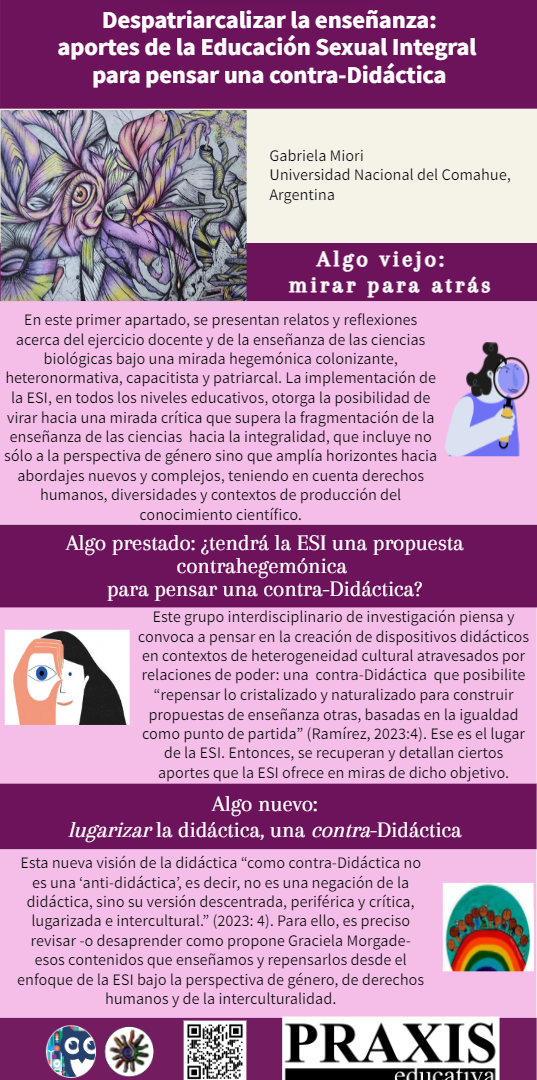Depatriarchalize teaching: contributions of Sexual Education to think a counter-Didactics
DOI:
https://doi.org/10.19137/praxiseducativa-2024-280113Keywords:
didactic against hegemonic; ESI; localized didactic devices; intersectionalityAbstract
This presentation summarizes the evolution of my experience as a Biology teacher, which starts from a traditional perspective of teaching the discipline towards the search for new paradigms – antipatriarchal, antiability and intercultural- didactic by the hand of Sexual Education (ESI). Contributions are taken from feminist thought and from other social groups produced in various historical and political contexts that question knowledge and knowledge given from the recognition of the persistence of the coloniality of power-knowledge, that is, of a hierarchy imposed by the axes of power of race, social class, sex-gender, among others, fundamentally, in the educational field. The intersectional paradigm of ESI is proposed in the creation of didactic devices for the construction of a counter-hegemonic didactics, that is, a counter-Didactics. It should be sought in those places where it is possible to “rethink what is crystallized and naturalized to build other teaching proposals, based on equality as a starting point” (Ramírez, 2023:4). That is the place of the ESI.
Downloads
References
Berkins, L. (2003). Un itinerario político del travestismo. En D. Maffía (Comp.), Sexualidades migrantes.
Género y transgénero (pp. 127-137). Scarlett Press.
Butler, J. (2019). El género en disputa. Paidós.
De Alba, A. (1995). Currículum: crisis, mitos y perspectivas. Miño y Dávila Editores.
Escobar, A. (2017). Autonomía y Diseño: la realización de lo comunal. Tinta Limón.
Fainsod, P. (2018). Clase 2: Perspectiva de género. En Curso virtual: Educación Sexual Integral para
estudiantes de profesorados universitarios. Editorial de la Facultad de Filosofía y Letras Universidad de Buenos
Aires.
Fausto-Sterling, A. (2006). Cuerpos sexuados. La política de gênero y la construcción de la sexualidad.
Melusina.
González del Cerro, C. (2018). Clase 1: Educación, géneros y sexualidades. En Curso virtual: Educación Sexual
Integral para estudiantes de profesorados universitarios. Editorial de la Facultad de Filosofía y Letras
Universidad de Buenos Aires.
Grimson, A. y Karasik, G. (2017). Introducción a la heterogeneidad sociocultural en la Argentina
contemporánea. En A. Grimson, Estudios sobre diversidad sociocultural en la Argentina contemporánea.
CLACSO-PISAC.
Grüner, E. (2016). Teoría crítica y contra-Modernidad. En J. G. Gandarilla, La crítica en el margen. Hacia una
cartografía conceptual para rediscutir la modernidad (pp. 19-60). Akal.
Karasik, G. y Grimson, A. (2017). Estudios sobre diversidad sociocultural en la Argentina contemporánea.
CLACSO-PISAC.
Lopes Louro, G. (2000). La construcción escolar de las diferencias sexuales y de género. En Códigos para la
ciudadanía. Formación ética como práctica para la Libertad. Cap 5. Ediciones Santillana SA.
Lopes Louro, G. (2012). Extrañar el currículum. En M. C. Spadaro (Comp.), Enseñar Filosofía hoy. Universidad
Nacional de La Plata.
Manzano, V., Novaro, G., Santillán, L. y Woods, M. (2010). Introducción a la problemática de la desigualdad.
Hacia un abordaje antropológico. En M. R. Neufeld (Comp.), Introducción a la Antropología Social y Política.
Editorial de la Facultad de Filosofía y Letras-Universidad de Buenos Aires.
Medina Melgarejo, P. (2016). Otras maneras de investigar en educación: descolonizar el camino. Teoría social
en América Latina, tránsitos y resonancias. Universidad Pedagógica Nacional. Horizontes Educativos. Mexico.
Morgade, G. (Coord.). (2011). Toda educación es sexual. La Crujía.
Puiggrós, A. y De Alba, A. (2022). Diálogos imprescindibles en educación. En S. Alesso, H. Yasky, D. Ewards y
R. Baradel (2021) ¿Qué docencia para estos tiempos? A 100 años del nacimiento de Paulo Freire. Ctera.
Ramírez, P. (2020). Una didáctica intercultural en la formación de docentes universitarios. Condiciones de
posibilidad en Furilofche warria Wallmapu mew. Educo. http://rdi.uncoma.edu.ar/handle/uncomaid/16037
Ramírez, P. (2023). Hacia el diseño de dispositivos didácticos otros en contextos de heterogeneidad cultural.
Praxis educativa, 27(1), 1-12. https://dx.doi.org/10.19137/praxiseducativa-2023-270103
Talani Zuvela, P. y Copolechio Morand, M. (2023). Sexualidad, cuerpos y perspectiva de género en la formación
docente: Reflexiones teóricas y experiencias pedagógicas de ESI. Novedades Educativas.
Tenti Fanfani, E. (2008). La enseñanza media hoy: masificación con exclusión social y cultural. En G. Tiramonti
y N. Montes, La escuela media en debate. Manantial.
Viveros Vigoya, M. (2016). La interseccionalidad: una aproximación situada a la dominación. Revista Debate
Feminista, 52, 1-17. Universidad Nacional Autónoma de México.

Published
Issue
Section
License
Copyright Notice
Editorial Committee Educational Praxis Magazine:
I hereby declare that I am the author of the article titled (article name), that it is original and my own and that it was not previously published in any other format or medium. I declare to know that the magazine will not charge me any type of fee under any circumstances, nor will I receive any type of monetary compensation If it were accepted for publication in Educational Praxis, I authorize the aforementioned magazine to publish it digitally and to advertise it on its social networks.
If the work is published, I adhere to the Creative Commons license called "Attribution - Non-Commercial Share Alike CC BY-NC-SA", through which it is allowed to copy, reproduce, distribute, publicly communicate the work and generate derivative works, as long as when the original author is cited and acknowledged. This license has been used since September 2018. In 2016 CC BY NC ND 4.0 was adhered to; and in the years 2017 and 2018 (January-August) CC BY NC 4.0.
This CC BY-NC-SA Share Alike license does not, however, permit commercial use of the work. As an author, the journal may establish additional agreements for the non-exclusive distribution of the version of the work published in the journal, it allows me to self-archive the published articles, in their post-print version, in institutional, thematic repositories, personal web pages or any other relevant use. with the recognition of having been first published in this journal.
Educational Praxis adheres to DORA (Declaration on Research Assessment) signed in San Francisco, California, on December 16, 2012, and to the Declaration of Mexico (Joint Declaration LATINDEX - REDALYC - CLACSO - IBICT).














_(1)2.png)


3.png)











_(2).png)






2.jpg)









